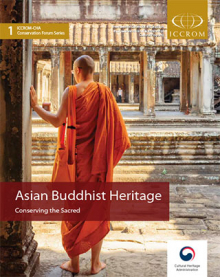
Around the world, religious sites dominate the lists of protected heritage properties. As a result, the needs of a community, who regard these spaces as functional and sacred, must be balanced with the demands of heritage conservation practices and site management.
This book is a collection of papers on this theme, as applied to Buddhist heritage sites throughout Asia. It takes into consideration Buddhist philosophy and how that shapes the definition of cultural heritage and its preservation. What should be conserved and restored, and who should be involved in this process? How is the Buddhist world view reflected in contemporary Asian society, and how does that translate into the management and maintenance of a sacred place? How do the tangible and intangible attributes of Buddhism relate to established conservation theory, ethics and practice?
These papers were presented in 2013 at a forum in Seoul, Korea, jointly organized by ICCROM and the Korean Cultural Heritage Administration. It is the first instalment of a five-book series that will cover some of the most pertinent topics in cultural heritage preservation and management in Asia.
For cultural heritage practitioners, teachers and students in Asia or elsewhere in the world, this book offers a range of viewpoints and case studies highlighting challenges and successful outcomes of conserving living monuments. Though the focus is on Buddhist heritage, many of the issues are universal, and the views presented by the authors can offer a fresh perspective to a pertinent question in the culture sector.
